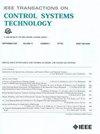Resilient Microgrid Scheduling With Synthetic Inertia From Electric Vehicles Within a Network of Charging Stations
IF 3.9
2区 计算机科学
Q1 AUTOMATION & CONTROL SYSTEMS
引用次数: 0
Abstract
Vehicle-to-grid technologies are proposed as potential providers of virtual inertia for microgrids (MGs). This article addresses an energy and charging scheduling problem for an MG and investigates how to utilize a network of electric vehicle (EV) charging stations (CSs) to provide sufficient virtual initial for frequency regulation that guarantees the safe transition of MG to the islanded operation during extreme events. The charging behavior of EV within a CS network is complex and can be actively influenced by charge point power and tariff set up by the CS network operator subject to MG operation requirements. A novel modeling framework is proposed to capture these aspects and integrate them into the MG energy management. The goal is to determine the optimal power allocation among distributed energy resources within an MG, minimizing operation costs while ensuring sufficient frequency support with virtual inertia contribution from EVs. To deal with inevitable uncertainties associated with EV arrivals at a CS, we employ joint distributionally robust chance constraints (DRCCs) to mitigate the impact of uncertainty and enhance the robustness of the algorithm. These joint DRCCs are decomposed into individual ones via an optimized Bonferroni approximation (BoA) method, then suitably relaxed into convex forms, which maintains the solvability of the overall problem. The effectiveness of the method is validated with case studies based on a modified IEEE 14-bus system.充电站网络中考虑电动汽车综合惯性的弹性微电网调度
提出了车辆到电网技术作为微电网(mg)虚拟惯性的潜在提供者。本文解决了电动汽车(MG)的能量和充电调度问题,并研究了如何利用电动汽车(EV)充电站(CSs)网络为频率调节提供足够的虚拟初始值,以保证在极端事件下MG安全过渡到孤岛运行。电动汽车在CS网络中的充电行为是复杂的,并且会受到CS网络运营商根据MG运行要求设置的充电点功率和资费的积极影响。提出了一种新的建模框架来捕获这些方面并将它们集成到MG能量管理中。目标是确定MG内分布式能源之间的最佳功率分配,最大限度地降低运营成本,同时确保电动汽车提供的虚拟惯性提供足够的频率支持。为了处理与EV到达CS相关的不可避免的不确定性,我们采用联合分布鲁棒机会约束(drcc)来减轻不确定性的影响并增强算法的鲁棒性。通过优化的Bonferroni近似(BoA)方法将这些联合drcc分解为单个drcc,然后适当地松弛为凸形式,从而保持了整体问题的可解性。基于改进的IEEE 14总线系统的实例研究验证了该方法的有效性。
本文章由计算机程序翻译,如有差异,请以英文原文为准。
求助全文
约1分钟内获得全文
求助全文
来源期刊

IEEE Transactions on Control Systems Technology
工程技术-工程:电子与电气
CiteScore
10.70
自引率
2.10%
发文量
218
审稿时长
6.7 months
期刊介绍:
The IEEE Transactions on Control Systems Technology publishes high quality technical papers on technological advances in control engineering. The word technology is from the Greek technologia. The modern meaning is a scientific method to achieve a practical purpose. Control Systems Technology includes all aspects of control engineering needed to implement practical control systems, from analysis and design, through simulation and hardware. A primary purpose of the IEEE Transactions on Control Systems Technology is to have an archival publication which will bridge the gap between theory and practice. Papers are published in the IEEE Transactions on Control System Technology which disclose significant new knowledge, exploratory developments, or practical applications in all aspects of technology needed to implement control systems, from analysis and design through simulation, and hardware.
 求助内容:
求助内容: 应助结果提醒方式:
应助结果提醒方式:


